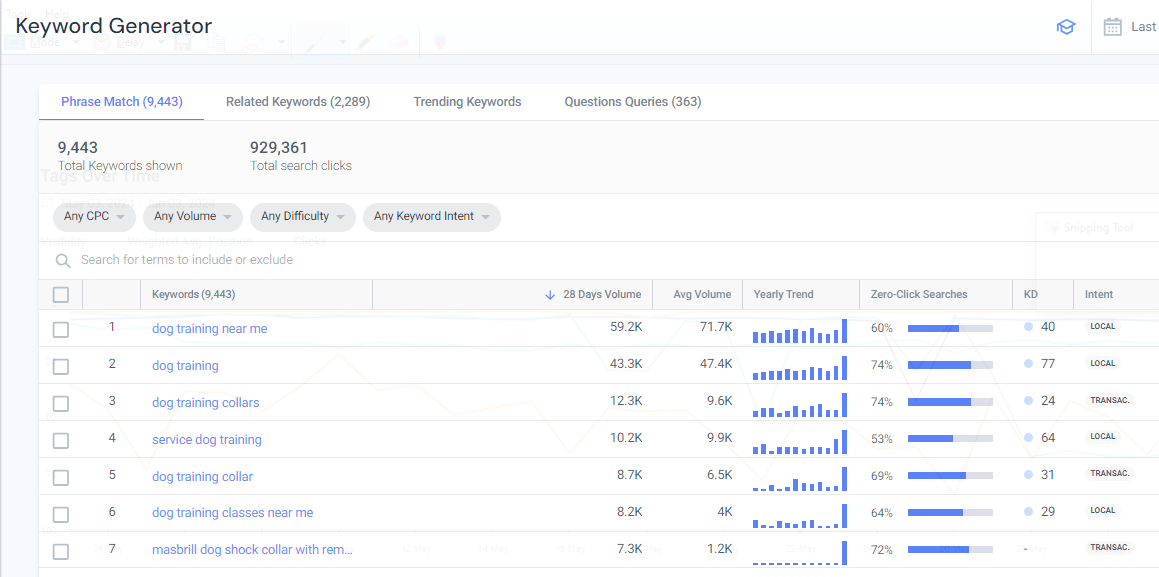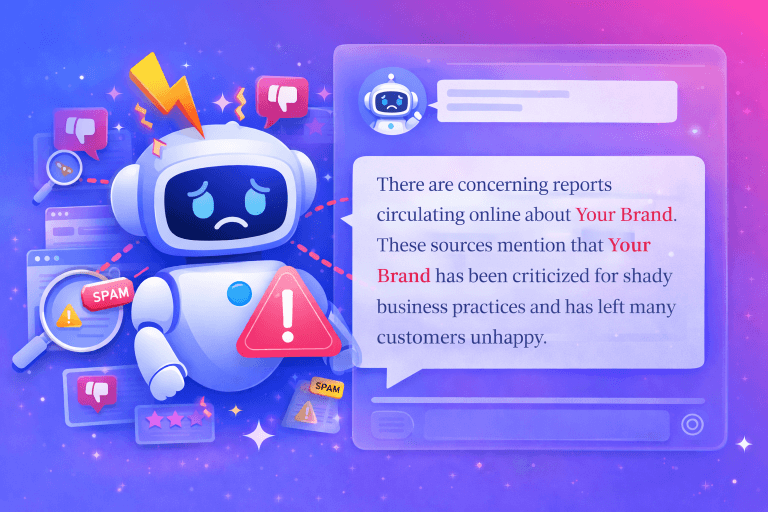Topical Authority In SEO: What Is It And How To Build It

Search engines have become more sophisticated, and your SEO strategies must evolve with them to keep up.
We are seeing from the May 2024 Google leak that the search engine algorithms have a number of site authority metrics that influence rankings. The question is, how do you increase your site authority in a way that brings massive traffic gains to your site?
In this post, you’ll learn:
- What topical authority is
- How to build topical authority in 3 steps
- How to measure topical authority
What is topical authority?
Topical authority is a site-wide measure of a website’s expertise on a particular topic. It’s established by consistently publishing a well-structured network of high-quality, comprehensive content that thoroughly covers various queries related to a chosen topic rather than focusing on individual keywords. A site with strong topical authority is recognized as a reliable and authoritative source within its niche or industry.
Why does topical authority matter for SEO?
Topical authority matters for SEO because it aligns your site with Google’s goals, and when you do that, you win big.
Google created site-wide metrics that measure the authority of a site for two reasons. Google needs to:
- Manage billions of pieces of content
- Surface quality content and reduce web spam
1. Managing web content
In order to manage literally billions of pieces of content, Google segments content into topics called knowledge domains. By doing this, the search engine can associate:
- Queries with the topic as a whole
- Sites that are authorities within the topic
By segmenting the web into topics and subtopics, and associating sites with those topics, within any given search, Google only has to rank sites that are associated with the topic. According to Koray Tuğberk GÜBÜR, this saves the search engine massive amounts of resources when ranking content.
The key takeaway: By establishing your site as the biggest authority in your niche, you are saving search engine resources. And when you do that, the search engine will reward your content by consistently using your content to answer topical queries.
2. Reducing spam
Let’s face it: Google has a spam problem. This has always been a problem for the search engine, but with the sudden convenience of AI-generated content, site owners are seeing an opportunity to create huge volumes of content for almost no cost. The result?
Spam, spam, and more spam.
By focusing on quality sites that are authoritative in their niche, Google is able to select quality sites to rank in search results.
The key takeaway: If you can establish your site as high quality, you will be able to stand out in the sea of mediocre content.
How does topical authority work?
As mentioned above, Google, being a semantic search engine, breaks down the information in its index into topics called knowledge domains. Included in each knowledge domain is a list of:
- Queries
- Entities
- Layout designs
- Search patterns
- User segments
Search engines also associate a list of sites that are experts in each knowledge domain or topic, and they regularly look to these sites to answer queries associated with these knowledge domains. The search engines work this out by looking at each site’s content and navigation. Search engines classify these sites according to their:
- Specialty
- Authority
- Coverage
Here’s where topical authority SEO comes in.
The strategy is designed to establish your website as the leading authority in your niche by answering more queries, serving more search intents than your competitors, and presenting the information on your site in a logical hierarchy that both users and search engines can understand. By doing this, you establish your site as the preeminent authority in the niche, and your site will be relied upon to answer more questions in the search engine results pages.
Digging a bit deeper: How to become an entity authority
Let’s understand this further. When you become an authority on a topic, you become the go-to source of information about an entity in Google’s Knowledge Graph. This is powerful because many search queries are requests for information about entities.
Google can categorize these queries into questions about what, when, where, who, or how based on the entities mentioned. For instance, if you type the query ‘funk brothers bass player’, Google recognizes this as a ‘who’ question about the entity ‘funk brothers’. Google then retrieves content that adequately answers the query. For the query ‘funk brothers bass player,’ the results might look like this:
Naturally, when searching for content to answer the query, Google will prioritize sources recognized as authorities on the subject or entity.
How to build topical authority in 3 easy steps
Building topical authority requires planning to execute effectively. You need to understand:
- How to structure your content into topics and subtopics
- What content to make (and what to update)
- What to take into account when structuring your internal links
Once you’ve compiled all this information, you’ll need to organize it into a topical map. Your topical map should include a mindmap of content that includes topics and subtopics as well as a list of content assets matched to each.
1. Figure out your topic/subtopic hierarchy
Your next step is to determine the structure of your content by breaking it up into topics and subtopics. Your goal is to create a content hierarchy that users and search engines can understand and present that content structure in your site architecture.
Analyze your competitor’s site structure
One of the easiest ways to determine how to break down your topic is through competitor analysis. Look for successful sites in your niche. If Google loves these sites, it’s likely that they have organized their content into a logical structure that is machine-readable. Uncovering their website structure and topical hierarchies can give you a gold mine of information. Look for the topical hierarchy in:
- Menu and URL structure
- Breadcrumbs
- Internal links
Use this information to guide your structure and give you inspiration. For instance, if you were to search Google for “pet food,” you might come across the ecommerce site chewy.com. Take a look at their “Shop” menu.
You can easily see how the site breaks up the pet food topic into pet types:
- Dog
- Cat
- Fish
- Bird
- Small pet
- Reptile
- Farm animal
- Horse
- Pharmacy
- Pet parents
What’s more, each subtopic is broken down further. For instance, the Dog topic is broken down into:
- Food
- Treats
- Supplies
If you want to take this research to the next level, you can analyze your competitors’ folder structure using the Folders report in the Similarweb Website Analysis tool. The tool will show you a breakdown of the site’s folder structure according to traffic share.
This will help you discover which areas the site is winning and where your opportunities are. For instance, below, you can see that greenies.com gets 27.8% of its traffic to its dog-focused content and only 9.13% of its traffic to its cat-focused content.
Is this an opportunity or a sign that the cat audience is less active?
It depends on who you are and what you’re looking to uncover. If you’re a smaller pet supplier, you might learn from this that you should stock more general pet supplies rather than cat-specific items, as those are likely to sell more. On the other hand, if you’re a cats-only provider, you might want to consider looking deeper into Chewy’s cat segment pages to see how you can improve and win that traffic, for example.
Examine Google’s Knowledge Panels
It’s important to understand that Google’s Knowledge Panels come directly from the information in Google’s Knowledge Graph. This means Knowledge Panels should be the first place you go when trying to understand how Google understands and categorizes content structure.
What’s more, often Google tells you where it’s pulling the information from. This is low-hanging fruit as an SEO, and your best source of information.
To do this, simply search Google for your entity and look to see if there is a Knowledge Panel featured. Below is an example of Google giving you some great information to work with.
As you can see, Google breaks the topic of Jean Sibelius into subtopics, including:
- Overview
- Compositions
- Listen
- Videos
- Tone Poems
Since we are looking for subtopics you will create content around, it makes sense to ignore Overview, Listen, and Videos. That leaves us with:
- Compositions
- Tone poems
2. Research all topically related queries
If you’ve been following along, you should have a good understanding of your content structure, including categories and subcategories to include on your site. The next step is to list out all of the user queries Google associates with each topic or knowledge domain. The more comprehensive your list, the better, and the more likely you are to rank for each.
Find search queries through keyword research
A quick and easy way to find a comprehensive list of search queries is to use a keyword research tool.
Simply pick a seed keyword that represents your topic or subtopic. It’s important not to go too broad when picking your seed keywords. For instance, if you are running a dog training business, a good seed keyword would be ‘dog training’. ‘Dogs’, on the other hand, will bring you results irrelevant to your site.
Once you’ve done that, use filters to find keywords that can represent individual pages.
For instance, using the Similarweb Keyword Generator you can uncover:
- Question queries filter to find keywords that have a clear user intent
- Related keywords filter to expand your keyword list by seeing keywords that are tangentially related to your seek keyword
- Keyword intent filter to target all stages of the user journey
- Keyword difficulty filter to find easy-to-rank-for keywords in your niche
Spot gaps in your content with keyword gap analysis
Topical authority is a competitive strategy. Your goal is to cover more search terms associated with your topic than your competitors. Keyword gap tools are a great way to see what keywords your site is missing out on that your competitors are targeting.
For example, below, we are analyzing gardendesign.com and four of its key competitors using the Similarweb Keyword Gap tool, which lists all the keywords driving traffic to these sites.
We see that gardendesign.com is getting a mere 8.44% of all the traffic. This means the site is only targeting a fraction of the keywords in its competitive space.
By using the Opportunities filter, we quickly see the keywords that the site’s competitors are targeting that gardendesign.com is not. You can use this information to increase your topical coverage.
Similarly, if you are creating a new site, you can use the Core Keywords filter to identify keywords from which all the analyzed sites are getting traffic. To establish topical authority, your site must target these core keywords with relevant content, at a minimum.
You can find the Keyword Gap tool within the platform:
Search > Keyword Opportunities > Keyword Gap.
In this example, we can see where gardendesign.com and its competitors’ rankings overlap.
Find topical keywords using SERP feature analysis
One of the simplest ways to find user queries related to your knowledge domain is to look at the Google Search Engine Results Pages (SERPs). Google’s SERP features tell you which user queries actually relate to your topic.
Look through:
- People Also Ask boxes
- People Also Search For features
- Autosuggest
3. Plan your content
It’s not enough to have a large volume of keywords segmented by topic. Your next step is to identify the actual content you need to create. When researching keywords, you most likely found endless variations of each keyword. Now, switch your focus to user search intent. Group all keywords with the same or similar user search intent into one page.
Additionally, it’s important to understand that you can target more than one user intent per page.
For instance, if you were writing a beginner’s guide to meditation at a high level, you are teaching people how to meditate. But within the article, you can target related intents such as:
- What is meditation
- Why learn to meditate
- How to meditate
By doing this, you can turn a keyword list into a clear content plan.
How to measure topical authority
The big question is how do you measure topical authority. There is no definitive way to do topical authority analysis, but data can give you an approximation.
You can look at this from two perspectives:
- Analyzing your competitive landscape
- Tracking your rankings by topic
1. Analyze your competitive landscape
Your goal here is to analyze a group of sites within a niche and see the relative traffic share of each site within a topic.
To do this with the Similarweb Website Analysis tool:
- Analyze a site with its top competitors
- Navigate to the Keywords report
- Pick the topic you want to focus on using the topic filter
The report will give you an understanding of the authority of each site based on traffic share.
For instance, we looked at chewy.com and four of its competitors: Petco, Pet Smart, Pet MD, and Greenhouse. Below, you can see that when we filter only cat-related keywords, chewy.com gets 14.96% of the traffic share, while petmd.com gets 80.53%.
You can find the Keywords report in the platform:
Website Analysis > Search > Keywords
2. Track your rankings by topic
Since topical authority is a strategy designed to increase your rankings for keywords within your niche, you need to have a way of tracking how your efforts are paying off. This is relatively easy if you have a site that’s focused on one topic, but how do you measure your success if you are targeting more than one topic or if you have several subtopics? Tracking them all in one campaign will not give you the clarity you need.
The best way to solve this is to segment your site using keyword tags. You can do this with the Similarweb Rank Tracker in the Tags report. The report allows you to group your keywords according to topic, which will give you an understanding of how each topic or subtopic is trending over time.
Topical authority: Far from the final word
Topical authority is a site-wide metric that you have control over. With a little effort (and the right tools), you can signal to search engines that your site is the go-to in your topic, which could result in massive traffic gains.
But, in order to do that, you need to start with understanding your competitive landscape, building a plan to be more competitive, and developing high-quality, high-ranking content.
The key ingredient is digital insight. With Similarweb Digital Data you can:
- Understand your competitive landscape and perform keyword gap analysis
- Dig into your competitors’ site and content structure
- Measure a site’s topical authority by looking at comparative traffic share
FAQ
What is topical authority SEO?
Topical authority SEO is an SEO strategy where a site features an extensive network of quality content that thoroughly covers a topic and is structured in a way that search engines and people can easily navigate. The goal is for the site to become an authority on the topic. When the site becomes an authority on a topic, Google is likely to rank it higher.
Why is topical authority important?
Topical authority is important because it establishes your business as an authority in your niche to search engines. When your business has topical authority, it is perceived as a trusted source of information and is more likely to be respected and recognized by users for its knowledge and experience.
Track Gen-AI And Organic KPI's On The #1 SEO Platform
Give it a try or talk to our marketing team - it’s free!























![GEO Framework For Growth Leaders [+Free Template]](https://www.similarweb.com/blog/wp-content/uploads/2026/02/attachment-growth-leader-geo-decision-framework-768x429.png)